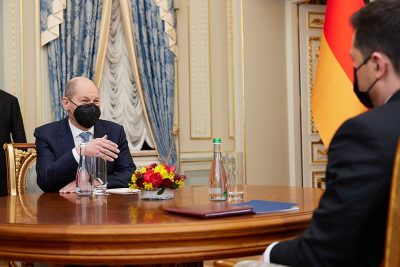Scholz Admits that “Many Germans” Don’t Support His Policies regarding “Aid for Ukraine” and “Sanctions on Russia”

All Global Research articles can be read in 51 languages by activating the Translate Website button below the author’s name (only available in desktop version).
To receive Global Research’s Daily Newsletter (selected articles), click here.
Click the share button above to email/forward this article to your friends and colleagues. Follow us on Instagram and Twitter and subscribe to our Telegram Channel. Feel free to repost and share widely Global Research articles.
Give Truth a Chance. Secure Your Access to Unchained News, Donate to Global Research.
***
The German Chancellor admitted that support for Ukraine and sanctions against Russia are not popular among “many citizens” in Germany. This is the natural repercussion of the anti-Russia sanctions imposed by Chancellor Olaf Scholz, which has resulted in the German economy declining and average citizens struggling.
The popularity of the ruling coalition in Germany is falling due to support for Ukraine and sanctions against Russia, Scholz admitted in an interview with German broadcaster ARD.
“It is true that there are many citizens who do not agree with the fact that we support Ukraine, who also do not agree with the fact that we have imposed sanctions against Russia. But, in my opinion, there is no alternative option that consists of not doing this,” he said.
The German leader responded to a question about the drop in support for the ruling coalition, especially in eastern Germany, where the far-right Alternative for Germany (AfD) party is leading in the run-up to elections in several states, according to polls.
Scholz said Germany was ready to seize opportunities for peaceful development, but “that would not mean the surrender of Ukraine.”
Germany is the second largest aid donor to Ukraine after the US. Scholz’s coalition, made up of the chancellor’s Social Democratic Party (SPD) as well as the Greens and Free Liberals, won the European Parliament elections with 31%, while the AfD came in second, with 15.9%.
A study by the credit company Creditreform reveals that the number of company bankruptcies in Germany has reached 11,000 since the beginning of 2024, a record number in almost a decade. The country is suffering from a recession caused, among other things, by high energy prices due to the interruption of gas supplies from Russia.
The head of economic studies at Creditreform, Patrick-Ludwig Hantzsch, explained that the reasons for the increase in company bankruptcies are the effects of the 2023 recession, the current crisis, and the weakness of the economic situation.
“All of this combined is breaking the necks of many companies,” added Hantzsch.
At the same time, the number of individual bankruptcies is also growing: in the first six months of 2024, 35,400 cases were registered, which is 6.7% more than in 2023.
According to Creditreform, the German economy is now suffering a recession caused, among other things, by high energy prices due to the interruption of gas supplies from Russia, which explains why “many citizens” in Germany are against the sanction regime and continued support for Ukraine.
Bloomberg also recently reported that more and more Germans are finding it difficult to make ends meet due to the turbulence affecting Europe’s largest economy.
“While government largesse and vast savings had long kept financial strife at bay, a reversal of state support, and the steady erosion of purchasing power by inflation and lofty interest rates are leaving a rising number of households overburdened,” reported the outlet.
According to Bloomberg, the root of the problem is COVID-19, which affected the finances of many workers, as well as the refusal to receive Russian energy.
“The former upended the finances of many workers, while the latter transformed Germany from Europe’s growth engine into its biggest laggard,” the article writes.
Creditreform data shows some 5.65 million Germans were classified as over-indebted in 2023, the first increase since 2019.
Germany, like Europe as a whole, faced a major energy crisis caused in many ways by sanctions against Russia due to its special military operation in Ukraine. Moscow repeatedly announced that the EU made a serious mistake in renouncing the acquisition of Russian hydrocarbons. As Russian President Vladimir Putin pointed out, Europe hoped that if it did not receive Russian gas, Russia would collapse, but instead, it boomeranged.
For this reason, the German chancellor promised on June 24 relief for the country’s economy and measures to promote business investment. However, being able to impose new economic measures would require support from the leaders of Germany’s 16 states, who previously insisted on reducing some of the tax breaks and other measures, meaning the proposal will inevitably become highly politicised.
With Germans suffering as a direct result of Scholz’s anti-Moscow policies, it is little wonder that many oppose the sanctions and why the ruling coalition is losing popularity. His government has become one of the most unpopular in German history as he oversaw the country’s transformation from a European economic powerhouse to one that even Greece is outperforming, Europe’s poster child of economic depression.
*
Note to readers: Please click the share button above. Follow us on Instagram and Twitter and subscribe to our Telegram Channel. Feel free to repost and share widely Global Research articles.
This article was originally published on InfoBrics.
Ahmed Adel is a Cairo-based geopolitics and political economy researcher. He is a regular contributor to Global Research.
Featured image: Olaf Scholz, federal chancellor of Germany, meets Volodymyr Zelenskyy, president of Ukraine, in Kiev, Feb. 14, 2022. (President of Ukraine)

